Wasting chemicals or getting inconsistent results from poor dosing? This inaccuracy costs time and money. Micro liquid pumps offer the solution.
Micro liquid pumps enhance precision in chemical dispensing systems by delivering highly accurate, repeatable, and controllable small volumes of fluids, crucial for applications demanding exact measurements and minimal waste.
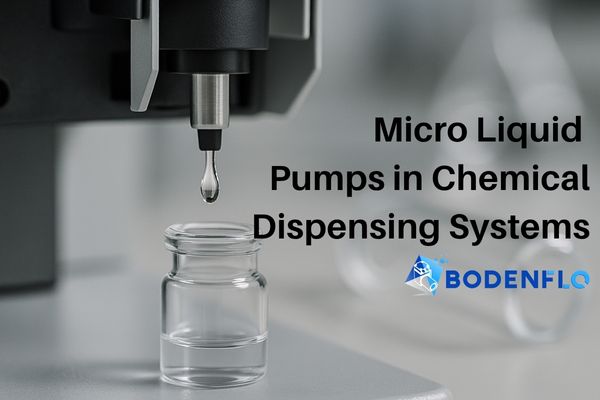
The demand for exactness in handling chemicals is higher than ever. Whether in laboratories, industrial processes, or medical devices, getting the right amount of liquid dispensed is critical. It's not just about efficiency; it's often about safety and efficacy. I've seen firsthand how traditional methods1 can fall short when dealing with very small volumes or requiring high repeatability. This is where micro liquid pumps2 come into their own, offering a level of control that was once hard to achieve. Let's delve into how these tiny powerhouses are making a big impact on chemical dispensing3.
What Are Chemical Dispensing Systems and Why Is Precision So Important?
Unsure what chemical dispensing systems do or why accuracy matters? Misunderstanding this can lead to selecting inappropriate, costly solutions. These systems deliver chemicals; precision ensures efficacy.
Chemical dispensing systems are automated or semi-automated setups designed to deliver specific quantities of chemicals. Precision is vital to ensure process accuracy, product quality, safety, cost-effectiveness, and regulatory compliance.
A chemical dispensing system4, at its core, is designed to transfer a defined amount of a chemical from a source to a target. This might sound simple, but the "defined amount" is where the challenge often lies. I've worked with many clients who initially underestimated the complexity. These systems can range from simple laboratory setups using a single pump to complex industrial machinery integrating multiple pumps, sensors, and control units.
Precision is not just a desirable feature; it's often a fundamental requirement. Consider these areas:
- Product Quality5: In manufacturing, incorrect chemical ratios can lead to defective products. Think about adhesives, coatings, or even food and beverage production.
- Process Efficiency6: Over-dosing wastes expensive chemicals, while under-dosing can render a process ineffective, requiring re-work.
- Safety: Handling hazardous chemicals demands precision to avoid dangerous reactions or exposure.
- Research & Development: In labs, accurate dosing is crucial for reproducible experiments and valid data. Even slight variations can skew results.
- Cost Control: Minimizing chemical waste directly impacts the bottom line.
The more critical the application, the higher the demand for precision, making the choice of dispensing technology, especially the pump, paramount.
What Role Do Micro Liquid Pumps Play in Chemical Dispensing?
Wondering how tiny pumps fit into complex chemical systems? Overlooking their role means missing out on compact, accurate solutions. Micro liquid pumps are the precise heart of modern dispensing.
Micro liquid pumps are the core components that actively move and precisely meter small volumes of liquid chemicals within a dispensing system, ensuring accurate delivery to the target point.
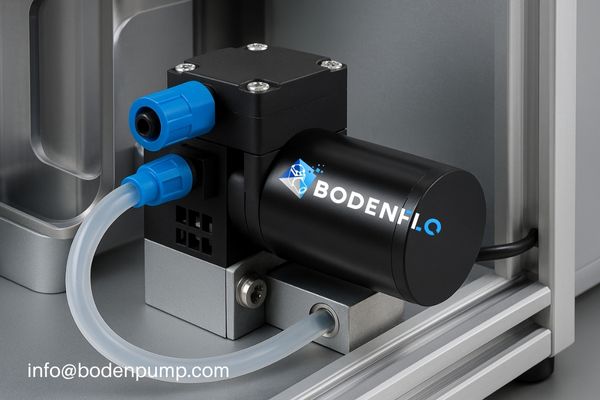
Micro liquid pumps are essentially the engines that drive the precision in many modern chemical dispensing systems. Their primary role is to take a specific, often very small, volume of liquid and move it accurately and repeatedly. Think of them as miniature, highly controlled delivery devices.
Here’s how they contribute:
- Volumetric Accuracy7: They are designed to dispense precise volumes, often in the microliter or milliliter range. This is something larger, less refined pumps struggle with.
- Flow Rate Control8: Many micro pumps allow for fine adjustment of the flow rate, enabling careful control over the dispensing speed and profile. This is important for tasks like gentle dosing onto sensitive surfaces or timed reactions.
- Miniaturization: Their small size allows for the development of compact dispensing systems, which is vital for portable devices, benchtop analyzers, or crowded lab spaces. I've seen them integrated into surprisingly small analytical instruments.
- Automation Enablement9: Micro pumps are easily integrated with electronic controllers, making them ideal for automated dispensing processes, reducing human error and increasing throughput.
They act as the direct interface for fluid movement, translating electronic signals into physical displacement of liquid. This direct control is key to their effectiveness.
Which Micro Pump Types Are Best for Chemical Dispensing?
Confused by the variety of micro pump technologies available? Choosing the wrong type can compromise your system's performance. Specific pump types excel at precise chemical handling.
Micro diaphragm pumps, precision piston pumps, and peristaltic pumps are commonly best for chemical dispensing, chosen based on fluid properties, required accuracy, flow rate, pressure, and chemical compatibility. Micro diaphragm pumps are a primary focus for us at BODENFLO due to their versatility and robustness.
When it comes to selecting a micro pump for chemical dispensing, several types stand out, each with its own advantages. I often guide clients through this selection process, as the right choice depends heavily on the specific application.
Here's a look at common types:
- Micro Diaphragm Pumps10: These are a cornerstone of our offerings at BODENFLO. They are excellent for reliable, continuous flow or precise dosing. They offer great chemical compatibility because the fluid path can be made from inert materials, isolating the media from the pump's mechanical components. They are also robust and can handle a wide range of chemicals, even some with small particulates.
- Precision Piston Pumps11: These are known for very high accuracy and repeatability, especially for dispensing extremely small, discrete volumes. The positive displacement action of the piston ensures a precise volume with each stroke. They can also handle moderate backpressures.
- Peristaltic Pumps12: These are excellent for sterile applications or when pumping very aggressive chemicals, as the fluid only contacts the tubing. They are gentle on fluids and easy to maintain by simply replacing the tube. However, tubing wear can affect long-term accuracy if not monitored.
The best choice involves considering factors like the chemical's viscosity, corrosiveness, required precision, flow rate, pulsation tolerance, and, of course, cost. Our expertise with micro diaphragm pumps allows us to tailor solutions for many challenging dosing needs.
| Pump Type | Key Advantages for Dispensing | Considerations |
|---|---|---|
| Micro Diaphragm | Excellent chemical compatibility, robust, good for continuous or dosed flow, handles some particulates | Can have slight pulsation (dampenable) |
| Precision Piston | Highest accuracy for discrete doses, good pressure | Can be sensitive to particulates |
| Peristaltic | Fluid only contacts tubing, gentle, good for sterile | Tubing wear, lower pressure, pulsation |
How Do Micro Pumps Improve Accuracy Compared to Traditional Methods?
Still relying on manual pipetting or gravity feed for dosing? These methods suffer from inconsistency and limited control. Micro pumps offer superior, digitally controlled precision.
Micro pumps improve accuracy by offering precise volumetric control, high repeatability, automated operation reducing human error, and the ability to handle micro-liter volumes far more consistently than manual methods.
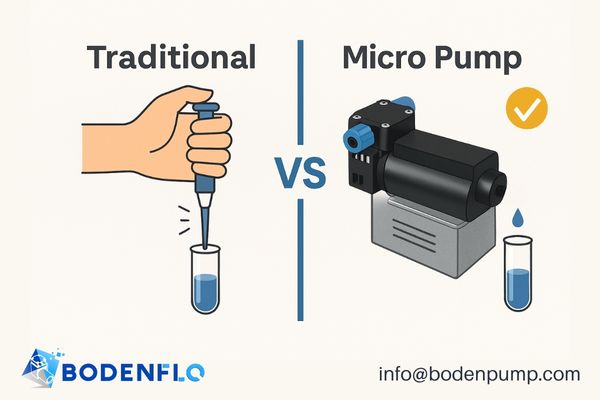
The leap in accuracy from traditional methods to micro pump-based systems is significant. I've seen many labs and production lines transform their consistency by making this switch. Traditional methods like manual pipetting, gravity-fed systems, or even larger, less precise pumps often introduce variability.
Here’s where micro pumps excel:
- Reduced Human Error: Manual dispensing is prone to operator-to-operator variations and fatigue. Micro pumps, especially when automated, eliminate this human factor, leading to much higher consistency.
- Precise Volume Control: Micro pumps are engineered to displace exact fluid volumes per cycle or per unit of time. This level of mechanical precision is hard to match manually, especially for volumes in the microliter range.
- High Repeatability: Once calibrated, a micro pump will dispense the same volume time after time with very little deviation. This is crucial for applications requiring tight tolerances.
- Programmability: Many micro pumps can be programmed for specific dispense volumes, flow rates, and even complex dispensing profiles (e.g., ramping up or down). This offers a level of control that manual methods simply cannot achieve.
- Handling Small Volumes: Dispensing sub-milliliter volumes accurately by hand is extremely challenging. Micro pumps are designed for this scale, opening up possibilities for miniaturized assays and processes.
The move to micro pumps is a move towards more reliable, data-driven, and efficient chemical handling.
In What Industries Are Micro Pumps Used for Chemical Dosing?
Think micro pumps are only for niche research labs? You might be surprised by their widespread industrial use. Micro pumps precisely dose chemicals across many sectors.
Micro pumps are used for chemical dosing in industries like medical devices, diagnostics, pharmaceuticals, analytical instrumentation, food & beverage, agriculture, water treatment, printing, and cleaning, ensuring precision and efficiency.
The application of micro pumps for chemical dosing is incredibly diverse. I've encountered their use in fields I wouldn't have initially expected. Their ability to deliver small, precise amounts of fluid has made them invaluable across a wide spectrum of industries.
Here are some prominent examples:
- Medical Devices & Diagnostics: This is a huge area. Think of point-of-care diagnostic devices accurately metering reagents onto test strips, or pumps integrated into analytical systems.
- Analytical Instrumentation: Gas chromatographs, liquid chromatographs, and various spectrometers rely on micro pumps for sample introduction and reagent delivery. Our micro diaphragm pumps13 are often chosen for their reliability here.
- Pharmaceuticals: During drug discovery and manufacturing, precise dosing of active ingredients and excipients is critical.
- Food & Beverage: Dosing of flavorings, colorants, vitamins, or preservatives in controlled amounts.
- Water Treatment: Accurate dosing of disinfectants like chlorine or pH adjustment chemicals.
- Agriculture: Precision dispensing of pesticides, fertilizers, or growth regulators in automated farming systems.
- Printing: Precise supply of inks in industrial inkjet printers and 3D printing applications.
- Cleaning: Accurate dosing of concentrated cleaning agents in industrial washers, automated cleaning systems, or even high-end consumer appliances.
- Chemical Manufacturing: Adding catalysts or reactants in microreactors or pilot plants.
Essentially, any industry that needs to add small, controlled amounts of liquid chemicals to a process or product is a potential user.
How to Choose the Right Micro Liquid Pump for Dosing Applications?
Overwhelmed by pump specifications and choices for your dosing needs? Selecting incorrectly wastes time, money, and compromises results. A systematic approach ensures you pick the perfect pump.
Choose the right micro liquid pump by considering fluid properties (viscosity, chemical compatibility), required accuracy, flow rate, dispense volume, pressure conditions, pulsation tolerance, lifetime requirements, and integration needs. Our team at BODENFLO can help guide you to the best micro diaphragm pump solution.
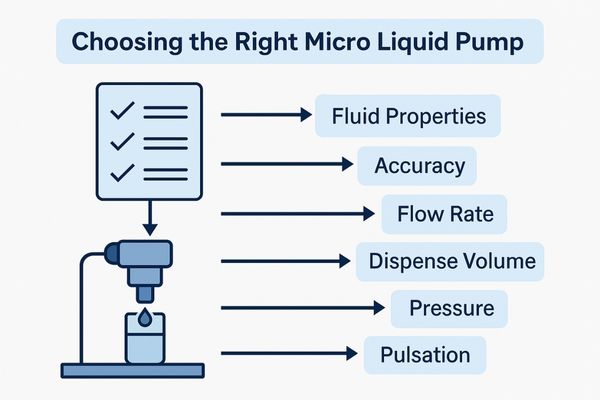
Selecting the ideal micro liquid pump for a specific dosing application requires careful consideration of several factors. It’s not a one-size-fits-all situation. As a manufacturer specializing in micro diaphragm pumps, we at BODENFLO often help customers navigate these choices.
Key questions to ask include:
- What is the fluid? Consider its viscosity, chemical aggressiveness, and whether it contains particulates. This dictates material compatibility. Our diaphragm pumps offer excellent chemical compatibility due to choices in diaphragm and valve materials (e.g., EPDM, FKM, FFKM).
- What is the required dispense volume and accuracy? Micro diaphragm pumps can offer good precision for both continuous flow and repeated discrete dosing.
- What flow rate is needed? From microliters to several milliliters per minute.
- What are the pressure conditions? Will the pump face significant backpressure? Our diaphragm pumps are designed to handle various pressure requirements.
- Is pulsation an issue? While diaphragm pumps inherently have some pulsation, this can often be minimized with specific pump designs or external dampeners if ultra-smooth flow is needed.
- What is the desired operational lifetime and maintenance interval? Our pumps are built for durability.
- How will the pump be controlled and integrated into the system?
Answering these questions systematically, often with our expert input, will guide you to the most suitable pump technology and specific model, ensuring optimal performance and reliability for your dosing system.
| Parameter | Why it's Important for Pump Selection | Example Consideration for Diaphragm Pumps |
|---|---|---|
| Fluid Compatibility | Prevents pump corrosion/degradation, fluid contamination | EPDM for general use, FFKM for aggressive chemicals |
| Viscosity | Affects pump's ability to move fluid, power requirements | Our diaphragm pumps handle a range of low to moderate viscosities |
| Accuracy/Repeatability | Critical for process outcome | Optimizing valve design and motor control enhances precision |
| Flow Rate/Volume | Must match application demand | Various models offer different flow rate capabilities |
| Back Pressure | Pump must overcome system resistance | Robust designs maintain flow against backpressure |
| Pulsation | Some applications require smooth flow | Multi-head designs or dampeners can reduce pulsation |
Case Studies: Micro Diaphragm Pumps Enhancing Precision in Action?
Wondering how these pumps perform in real-world scenarios? Generic claims are one thing, but specific examples show true impact. Our micro diaphragm pumps solve critical dosing challenges.
BODENFLO micro diaphragm pumps deliver precision in industrial inkjet printers by ensuring consistent ink supply for high-quality prints, and in analytical instruments by accurately dosing reagents for reliable test results.
Let me share a couple of examples where our BODENFLO micro diaphragm pumps have made a significant difference:
1. Optimizing Ink Supply in Industrial Inkjet Printers:
A manufacturer of industrial inkjet printers was facing issues with inconsistent print quality. Their existing ink supply pumps14 sometimes caused pressure fluctuations, leading to variable dot size and occasional nozzle clogging, especially with pigmented inks. This meant more maintenance downtime and wasted consumables.
- Challenge: Provide a stable, reliable ink flow with minimal pulsation to ensure consistent drop formation and prevent clogging.
- Solution: They integrated a series of our BODENFLO compact micro diaphragm pumps, specifically selected for their smooth flow characteristics and excellent chemical compatibility with various ink formulations.
- Outcome:
- Improved Print Quality: Consistent ink pressure resulted in uniform dot size and sharper prints.
- Reduced Nozzle Clogging: The steady, gentle flow helped minimize sediment buildup and clogging issues.
- Increased Uptime: Less frequent maintenance meant higher productivity for their end-users.
- Versatility: Our pumps handled different ink viscosities effectively.
This was a clear win, demonstrating how the right pump technology directly impacts the final product quality and operational efficiency in demanding printing applications.
2. Ensuring Accuracy in Automated Analytical Instruments:
A company developing benchtop analytical instruments for environmental water testing15 needed precise and repeatable dosing of multiple reagents. Their early prototypes struggled with cross-contamination between reagent lines and achieving the necessary microliter-level accuracy for sensitive assays.
- Challenge: Deliver minute, highly accurate volumes of different chemical reagents without cross-contamination, ensuring test result reliability.
- Solution: We worked with them to select specific BODENFLO micro diaphragm pumps14 for each reagent line. The pumps' inert wetted parts (using materials like PEEK and FFKM) ensured chemical compatibility and prevented leaching or absorption. Their precise volumetric displacement was key.
- Outcome:
- Enhanced Assay Accuracy: The precise reagent dosing led to more reliable and reproducible analytical results, which was critical for their instrument's certification.
- Minimized Reagent Waste: Accurate dosing meant no over-consumption of expensive reagents.
- Compact Instrument Design: The small footprint of our micro diaphragm pumps allowed for a more compact overall instrument design.
- Improved Reliability: The robust design of our pumps contributed to the long-term reliability of their analytical system.
In this case, the precision and material integrity of our micro diaphragm pumps were fundamental to the instrument's core function and market acceptance.
Frequently Asked Questions (FAQs)?
Have lingering questions about micro pumps for chemical dosing? Unanswered questions can delay your project or lead to errors. Let's address some common queries for clarity.
Common questions cover pump lifetime, calibration, handling viscous or aggressive fluids, and integration. Answers typically highlight material choices, design features, and recommended practices for optimal performance, especially for micro diaphragm pumps.

When people are considering micro liquid pumps for chemical dispensing, a few questions come up regularly. I've compiled some common ones:
- Q1: How long do BODENFLO micro diaphragm pumps last?
- A: Lifetime is excellent due to robust design and high-quality materials. It depends on operating conditions and the chemical, but our pumps are built for endurance, often tens of thousands of hours. The diaphragm and valves are key components designed for longevity.
- Q2: Do micro diaphragm pumps need frequent calibration?
- A: Our micro diaphragm pumps are designed for stable performance. Initial system calibration is important, and periodic performance checks are good practice in critical applications, but they generally maintain their output well.
- Q3: Can BODENFLO micro diaphragm pumps handle viscous or aggressive chemicals?
- A: Yes. We offer various diaphragm and valve materials (like EPDM, FKM, FFKM, PTFE) to ensure broad chemical compatibility, even with aggressive fluids. They can handle low to moderate viscosities effectively.
- Q4: How easy is it to integrate BODENFLO micro pumps into a larger system?
- A: We design our pumps with integration in mind, offering various mounting options, port configurations, and electrical interfaces for easy control and incorporation into your OEM devices or systems.
Why Choose BODENFLO Micro Pumps for Chemical Dispensing Systems?
Searching for a reliable partner for your precision dispensing needs? Choosing an unproven supplier can risk your project's success. BODENFLO offers expert solutions centered on our robust micro diaphragm pumps.
Choose BODENFLO for our specialization in high-performance micro diaphragm pumps, commitment to quality materials, engineering expertise for custom solutions, and dedicated support, ensuring optimal and reliable performance for your chemical dispensing systems.
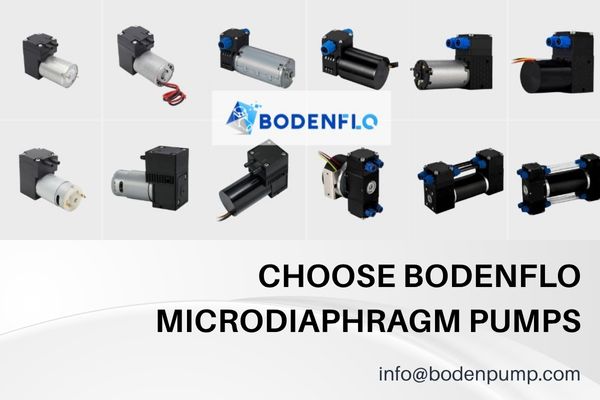
When precision and reliability in chemical dispensing are non-negotiable, your choice of micro pump supplier is critical. At BODENFLO, we specialize in micro diaphragm pump technology, providing solutions engineered for accuracy, longevity, and consistent performance in demanding applications.
Here’s why customers partner with BODENFLO for their micro diaphragm pump needs:
- Specialized Diaphragm Pump Expertise: Our core strength is the design and manufacture of advanced micro diaphragm pumps. This focus allows us to optimize every aspect, from fluid path materials to motor control, ensuring our pumps deliver precise and repeatable flow for dosing.
- Durability and Superior Chemical Compatibility: We use high-grade, carefully selected materials for wetted parts (diaphragms, valves, heads – e.g., PEEK, PPS, FFKM, EPDM, FKM). This ensures broad chemical resistance and long operational life, even with challenging or corrosive media.
- Engineering and Customization Capability: Our experienced engineering team understands the nuances of microfluidics and pump application. We excel at working collaboratively with you to tailor micro diaphragm pump solutions to your specific OEM requirements, ensuring optimal integration and performance.
- Commitment to Innovation: We continuously invest in R&D to advance our micro diaphragm pump designs. This includes improvements in valve technology for better sealing and efficiency, enhanced diaphragm longevity, and sophisticated motor control options for precise flow regulation.
- Dedicated Support and Partnership: We stand firmly behind our products. We offer comprehensive technical support to help you select, integrate, and operate your BODENFLO micro diaphragm pump effectively, viewing ourselves as your long-term partner in achieving dispensing excellence.
We aim to be more than just a component supplier; we strive to be your expert partner in micro diaphragm pump solutions for precision chemical dispensing.
Conclusion
Micro liquid pumps, particularly advanced micro diaphragm pumps like those from BODENFLO, are key to precise chemical dispensing. They improve accuracy, reduce waste, and enable advanced applications across many industries.
Looking to enhance the precision of your chemical dispensing system? Whether you're developing lab instruments, medical analyzers, or automated dosing equipment, BODENFLO micro diaphragm pumps offer the accuracy, reliability, and integration flexibility your application demands.
👉 Contact our engineering team today at info@bodenpump.com to discuss your requirements or request a customized solution. Let’s build your next innovation together.
-
Understand the shortcomings of traditional methods in chemical handling and why modern solutions are essential. ↩
-
Explore how micro liquid pumps enhance precision and safety in chemical dispensing, revolutionizing various industries. ↩
-
Learn about advancements in chemical dispensing technology that ensure safety and efficiency in various applications. ↩
-
Understanding the fundamentals of chemical dispensing systems can enhance your knowledge of their applications and importance in various industries. ↩
-
Delving into product quality will help you understand the critical role of precise chemical dispensing in manufacturing and production processes. ↩
-
Exploring process efficiency will reveal how it affects chemical usage and overall operational costs, crucial for any business. ↩
-
Understanding Volumetric Accuracy is crucial for ensuring precision in chemical dispensing systems. Explore this link to learn more. ↩
-
Flow Rate Control is essential for precise dispensing. Discover how it works and its applications in various fields. ↩
-
Automation Enablement enhances efficiency and reduces errors in dispensing processes. Learn more about its significance here. ↩
-
Explore this link to understand the unique benefits of Micro Diaphragm Pumps, especially their chemical compatibility and reliability in various applications. ↩
-
Learn about Precision Piston Pumps and their exceptional accuracy, making them ideal for precise chemical dispensing needs. ↩
-
Discover the advantages of Peristaltic Pumps, particularly in sterile environments and their maintenance ease, which is crucial for many industries. ↩
-
Explore how micro diaphragm pumps enhance reliability and precision in analytical instrumentation, making them essential for various applications. ↩
-
Explore how BODENFLO micro diaphragm pumps enhance performance in various industrial applications, ensuring reliability and efficiency. ↩ ↩
-
Discover the latest technologies and innovations in analytical instruments that improve accuracy and reliability in environmental testing. ↩


